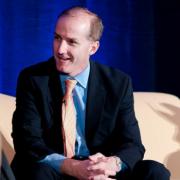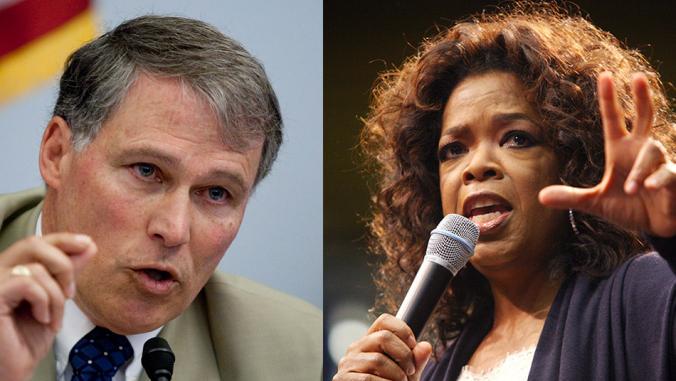Lessons on sustainability leadership from Jeff Immelt and The Boss
What do GE's CEO and Bruce Springsteen have in common? It's not hewing to conventional wisdom, for one thing.

We are deep in the middle of America's quadrennial political silly season and, given that this political cycle has been — already — the most bizarre in modern history, the most sane among us are doing our best to look away from the unsightly mess.
But recently, two non-politicians — both high-profile in their very distinct fields of endeavor — waded deep into the political muck.
GE's CEO, Jeff Immelt, in a letter published in the Washington Post, excoriated Democrative presidential candidate Bernie Sanders for comments the Vermont senator had made about his company to the New York Daily News editorial board; and Bruce Springsteen famously cancelled a concert in North Carolina to protest that state's recent enactment of anti-LGBT legislation.
I am generally not inclined to hero worship. If I were, Jeff and Bruce would be near the top of my list: Jeff, for reasons that should become apparent below, and Bruce because I have long lived in New Jersey and he is, well, The Boss. (Refer, in this regard, to the YouTube clip of Jon Stewart lauding Springsteen at the 2014 Kennedy Center Honors.)
What is extraordinary about Jeff's letter is not so much what he said about Sanders but that he said it (publicly) at all. I am not privy to the inner workings at GE, but I would bet any money that Jeff called out Sanders notwithstanding the unified and vigorous opposition of GE's government relations, public relations and communications groups.
"Don't do it, Jeff." "Walk away from the provocation, Jeff." "You can't win this one Jeff," is the advice he would have gotten.
You see, conventional corporate wisdom tells you that when politicians are fulminating for political gain in your direction, you turn the other cheek and take solace in the fact that not too many people are listening to politicians these days.
Conventional corporate wisdom tells you that when politicians fulminate for political gain in your direction, you turn the other cheek and take solace in the fact that not too many people are listening.
But Immelt launched a verbal scud at Sanders, noting that GE "had never been a big hit with socialists." More damning, in my eyes, Immelt revealed that Sanders in his 30 years as an elected official from a tiny state never bothered to visit the big GE factory in Rutland, Vermont — an inexplicable oversight on the part of this self-styled tribune of the working class.
Proving that you can't win taking on the left-wing intelligentsia (and undoubtedly causing some of his advisers to whisper "I told you so," but not to Jeff's face), Immelt immediately was criticized by The New York Times for his "ill-advised" and "snarky" attack on Sanders.
So why did he do it?
There is only one reason, I am guessing, and it is a reason worth celebrating. Sanders impugned the moral integrity of General Electric. And Immelt took the view that no matter who the accuser was or how important the accuser could become, he could not let an attack on the core value system of his company go unanswered.
I have seen Immelt do this before, back when he was the de facto leader, on the business side, of the major corporations that made up the U.S. Climate Action Partnership (USCAP). There, one snowy pre-Christmas night in the GE offices high up on 30 Rock, Jeff Immelt through sheer application of moral strength willed all 28 CEOs to sign on to a consensus position on climate change legislation which many felt was significantly damaging to their company's near term economic self-interest.
With the USCAP position destined to become a foundational element of the Waxman-Markey legislation, Immelt then led the rollout of the USCAP plan at a large media event staged on the Senate side of Capitol Hill. At that event, Immelt and GE were angrily assailed from the right by Sen. Bob Corker of Tennessee using similarly unsubstantiated insinuations as deployed by Sanders.
There also, in a packed room with the television cameras rolling, Immelt actually interrupted the senator in order to take strong exception to his comments about GE and its motivations for seeking to do what was right for the future of the planet. The senator immediately backed off his comments.
Empty words on a website
Most companies have a mission statement and a set of core values; many pay little attention to them. They are just empty words on the home page of the company website. Purpose-driven companies need morally grounded leaders, such as Jeff Immelt, willing to fight for the core value proposition of their companies. We need to get other CEOs to be more like Immelt, to infuse life into their company's core values, abide by them and defend them when they are called into question.
Immelt clearly has a very dearly held view of his massive company's essential inner core of values that he deemed worth protecting, even at the cost of alienating a potential president of the United States. For most other CEOs, the stakes are not nearly so high.
While not unique to GE — Unilever, J&J and other companies similarly stand for something more than just near-term bottom-line profitability — there need to be more such companies and leaders, to be cherished and leveraged by the sustainability movement. For where such leaders exist, leading companies that stand for something, that something invariably includes safeguarding the future of the planet.
Jeff, you are the boss.
Now turning to the recent actions of The Boss.
Cancelling an event, such as a concert, you say, may be easy. But if it is so damn easy, why has the NBA declined, so far, to move next year's All-Star Game out of North Carolina?
Critics were all over Springsteen for letting down his fans and for hurting the hourly employees who would have worked the event, but Springsteen evidenced great awareness of the harm his action might be causing in his letter announcing the cancellation.
Springsteen recognized the bigger picture potency of withholding economic activity in terms of influencing public policy.
The history books largely credit the end of public segregation in the American South to "top down" actions — Supreme Court decisions and federal civil rights legislation. Yet, I wonder whether the grassroots economic boycotts organized around the same time by local black leaders aimed at withholding the business of black consumers to establishments insisting on racial segregation actually did more to hasten the end of overtly segregationist practices in day-to-day life.
Certainly, more recently, we have seen how the mere threat of reduced economic activity from the likes of Marc Benioff at Salesforce.com, in Indiana, and Doug McMillon of Walmart, in Arkansas, quickly led to the moderation of objectionable public policy in those states.
Coalitions of the willing
The sustainability movement, I am convinced, will have to become more aggressive if it is to affect change through business leadership. It is not going to be enough for those companies that "get it" — that are on their own path to net-zero sustainability objectives — to focus all their energies on their own efforts.
As members of "coalitions of the willing," enlightened companies will need to withhold their business from companies that don't invest in the future but are content to seek competitive advantage in consumptive business-as-usual: waste into landfills, once-through freshwater usage, carbon into the atmosphere and so forth.
Companies such as DuPont already do this in the area of employee safety, where subcontractors that do not meet DuPont's exacting safety standards are not permitted to work on DuPont sites. Thanks to Walmart, Nike and others, sustainability practices as a selection criterion is working its way into supply-chain procurement, although not quickly or comprehensively enough. And they aren’t doing much at all about who they are willing to partner with or where they locate their businesses.
If business opportunities, defined broadly, start to be denied to companies indifferent to their impact, their sustainability practices will change quickly. I guarantee it.
So, let's all endeavor to be a little bit more like The Boss.





